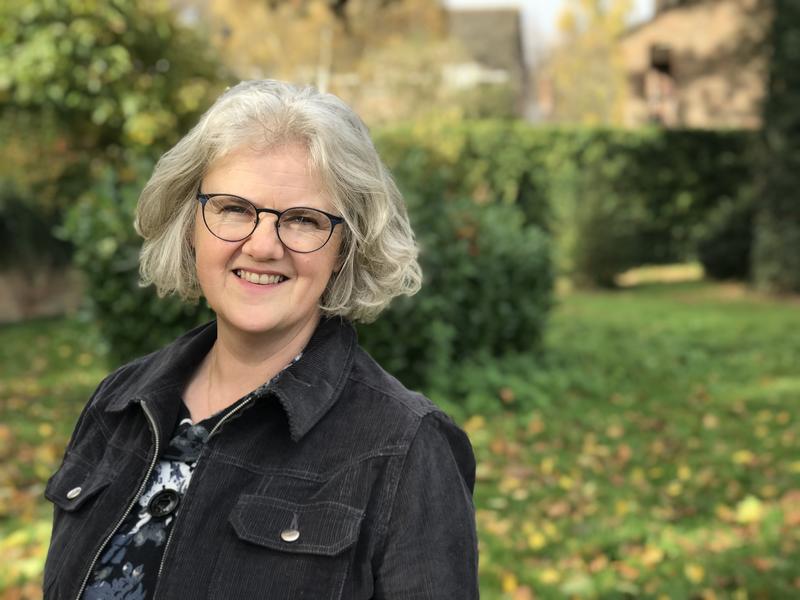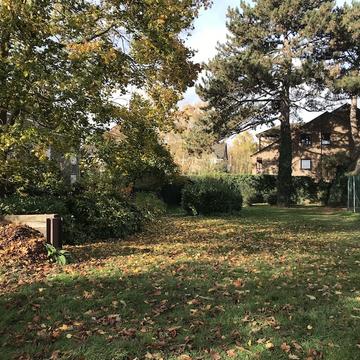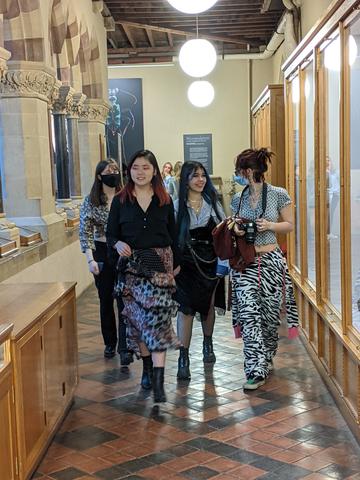HELPING CITY CENTRE POLLINATORS

HELPING CITY CENTRE POLLINATORS
Dr Kim Polgreen talks about an exciting new pollinator venture between Wytham Woods and Oxford communities
Published: 17 November, 2021
Author: Richard Lofthouse
Share this article
Dr Kim Polgreen (Linacre, 1989) is currently the inaugural Youth Educator in Residence at Wytham Woods, the 423-hectare, ancient semi-natural woodland which has been owned and maintained by the University of Oxford since 1942.
The Wytham Citizen Science Coordinator Fergus Chadwick secured a grant, and Kim is working with four Oxford schools towards a ‘pollinator project’ called ‘Plan Bee’, that will see students growing species of plant that will attract and sustain wild pollinators such as bumble bees, wasps, moths and flies, some of them in decline.

We meet at her fifth site for pollinators, a wonderfully forgotten corner of a tract of land owned and maintained by the City Council, called Alexandra Park – tucked in between Banbury and Woodstock Roads, just to the northern side of South Parade in Summertown (pictured, right).
Supported by key local residents and recently elected Oxford City Councillor for Summertown Katherine Miles, the idea is to retain everything that’s already great about the pocket of land – perhaps an acre in size – adding a small community orchard and a wild flower meadow and a ‘sensory garden’ theme.
The site already has some terrific mature trees but not so many that they block the light – a gracefully ageing chestnut tree, a mature sycamore tree and a majestic pine. The only removal will be some laurel that has spiralled out of control, and then the rest is planning and execution.
The broader park site has already had some far-sighted tree planting so that an avenue of mature trees lining the western flank of the park now has a counterpart avenue of trees on grass that is otherwise tightly mown and little more.
Kim says that an architect is in the process of drafting a plan, and the hope is to move quickly once it is improved by the grant-giving authority, in this case the Summertown and St Margaret’s Forum.
Kim says that the grant is a Community Infrastructure Levy (CIL) linked to North Oxford, that will be spent in North Oxford Schools.
The CIL system levies an additional charge on house builders, which can then be spent on a wide range of local assets but particularly parks and green spaces.
‘We are in discussion with The Cherwell School (contributing to the redevelopment of a garden area in their school grounds to be used to learning), and have approached primary schools St Aloysius and St Philip and St James. We will also offer Cutteslowe School the opportunity to participate.’
Whether you call it pocket rewilding or simply maximising the biodiversity of public land for the enjoyment and appreciation of all, the Wytham team’s work forms part of a fierce tide towards ‘growing things’ and reconnecting to the natural environment even within the city, with the recent COP26 to demonstrate why it’s so urgent that we re-establish our collective and individual relationship to nature.
Kim’s own back ground, apart from her DPhil in biochemistry at Linacre, includes being a KPMG Consultant in Sustainability Advisory Services. She also runs an annual Youth Sustainability Summer School at the University’s Environmental Change Institute (ECI), which this year involved the participants camping in the woods up at Wytham.
It’s a case of coming full circle – Kim was among the very first cohort of students who took the Environmental Change Institute’s by now famous Masters degree (MSc) in Environmental Change and Management, within the School of Geography (SOGE). That was back in 1994-5. Now she sees the purpose and value of it in conjunction with her DPhil.
‘I have felt always that despite not following a conventional academic career, everything I learned at Oxford has informed practically everything I have done since.’

Most recently, during the COP26 Climate March in Oxford, Kim helped 18 pupils from the Cherwell School, Oxford High School and St. Clare’s to borrow 20 bags of second-hand clothes from Summertown’s Oxfam store. They spent the morning up-cycling and creating new outfits, before heading to the Natural History Museum for an impactful photo shoot. So-called ‘fast fashion’ is believed to contribute as much as 8% of global climate emissions (pictured, left).
Picture Credits: University of Oxford/Richard Lofthouse; Kim Polgreen (of the University Natural History Museum)















